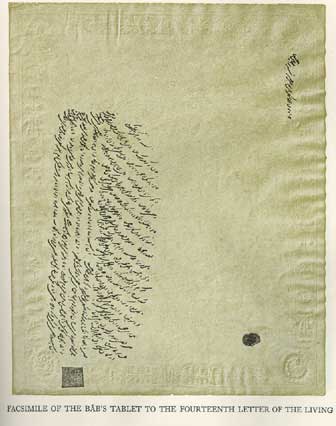
[14]
Tablet to the Fourteenth Haykal / Letter of the Living, Mullā Yūsuf Ardabīlī (d. Ṭabarsī 1265 /1849).
Colour Facsimilie in Muhammad Zarandí Nabíl-i A’zam (d. 1892), Tarikh ed. and trans. Shoghi Effendi Rabbani (d. 1957) as `The Dawn-Breakers: Nabil’s Narrative of the Early Days of the Bahá’í Revelation, (1932; Rep. Wilmette, IL, USA: Bahá’í Publishing Trust, 1996.
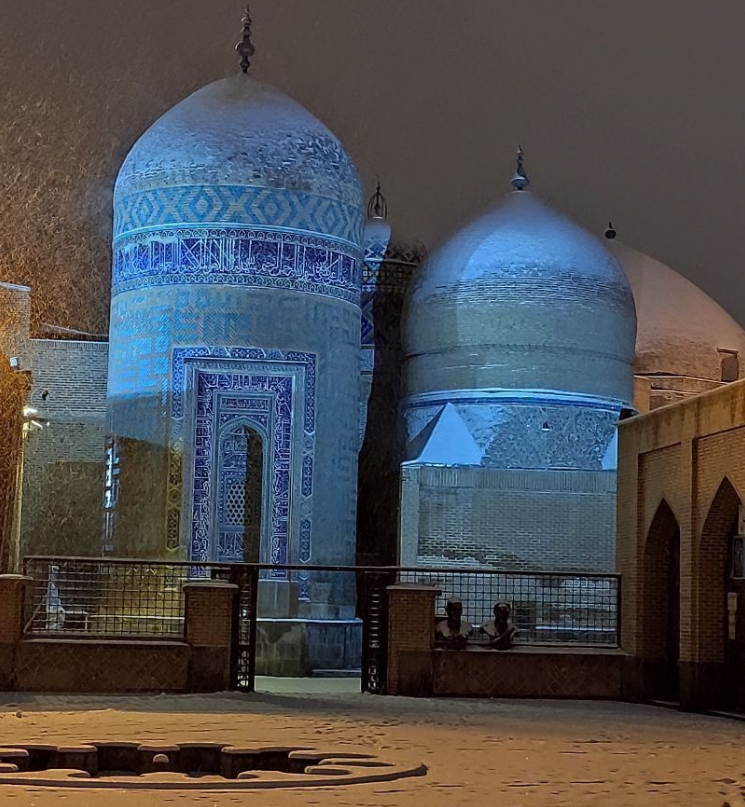
Shrine of the Safavid Shah Isma'il I (d.930/1524) in Ardabīl, Azerbayjan (Persia, Iran).
Tablet to the Fourteenth Haykal,
Letter of the Living, Mullā Yūsuf Ardabīlī (d. Ṭabarsī 1265 /1849).
Beta Trans. Stephen Lambden, UC Merced, 199X+ 2021.
In progress and under revision - Last updated 21-08-2021.
[A]
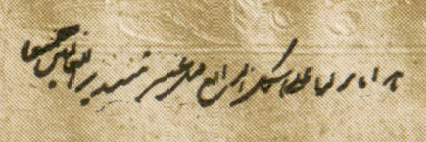
"This is that which We sent down unto the Fourteenth Haykal (Embodied "Temple") within which is a warning ([mundhir an] tandhir an) for all the worlds (li'l-`ālamīn jamī`a an)" (Dawn-Breakers).
[B]
![]()
Huwiyya
"He is"
[C]
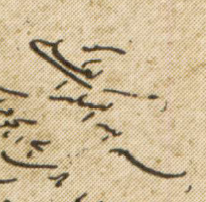
In the Name of God,
the All-Powerful (al-mutakabir), the Exalted One (al-`aliyy/ al-a`la) [Most Transcendent].
[D]

Ṭa' ("Ṭ") - Nūn )"N")
[The Isolated/Disconnected Arabic Letters Ṭ - N
Abjad value = 9+50 = [? 12]59 AH = 1843-4]
[I]
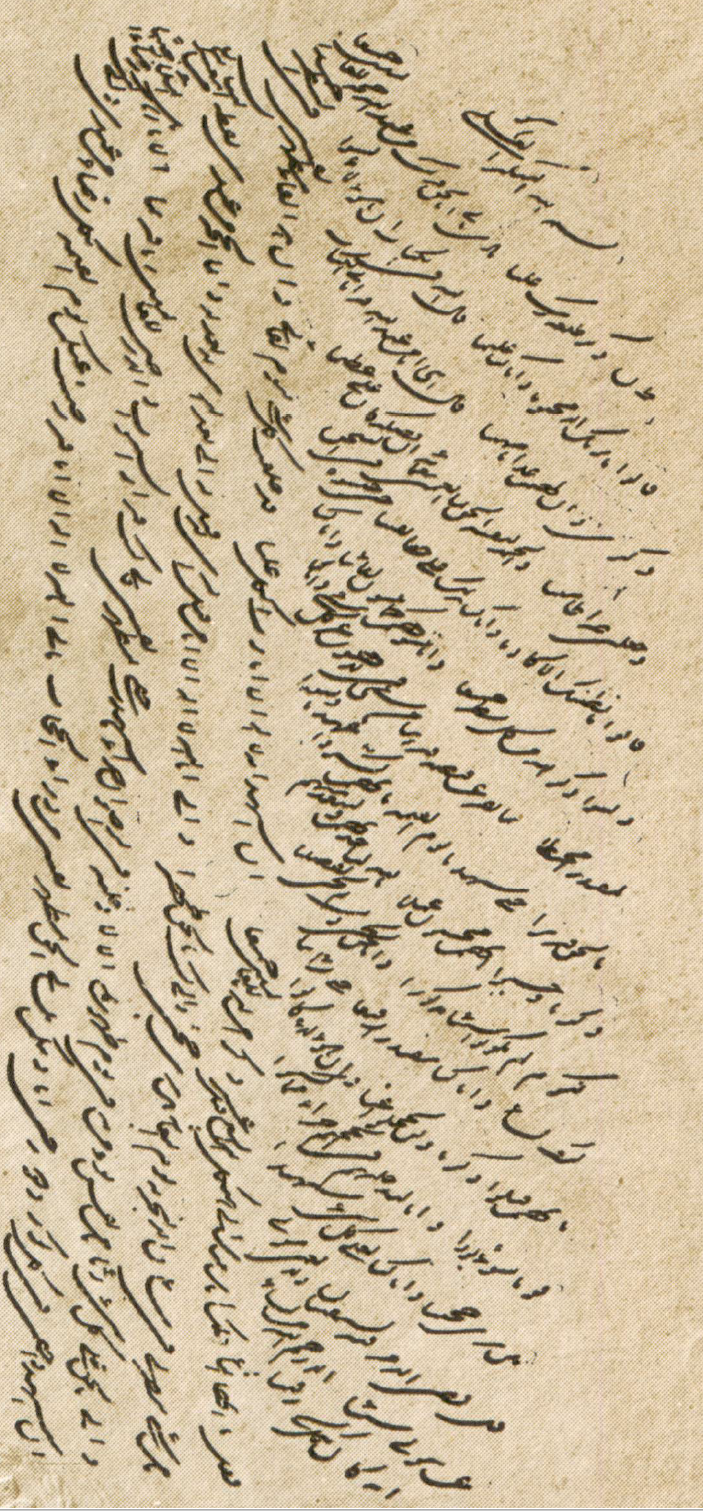
[I]
[1]
The Dhikr (messianic "Remembrance")
of the Countenance of thy Lord, is the One Elevated / `Alī (`aliyy /`Alī) who crieth out,
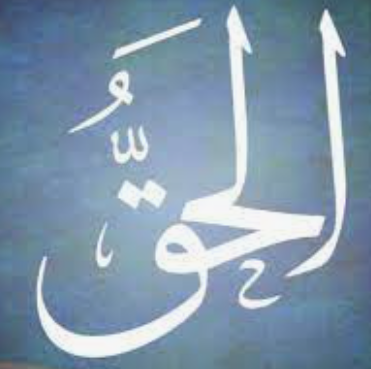
Anā al-ḥaqq
"I am indeed the True One" [God]
[2]
I was indeed, on the part of God,
the Ḥujjat Allāh ("the Proof of God")
unto all the worlds (li'l-`ālamīn jamī`a an)".
[3] This although they do assert, "We fail to see Thee [the Dhikr / the Bab] save as one possessed (majnūn) although We, We are yet One All-informed (`alīm an)!" [4] Thus saith God in the Book (al-kitāb [the Qur'an]) for these [deniers] are such as forget [have neglected] My Dhikr (Remembrance)!
[II]
[1] For these there will be a contempible punishment! (`adhāb an mahīn an) [2] He saith, "I am He Who representeth God (min `ind Allāh) [2] for I am He who cometh according to the Book! (al-kitāb)". [3] He made Me to be a Pathway of Inestimable Clarity (ṣirāt an muhīn an). [4] And Praised be unto His Logos-Self, the True One (li-nafsihi al-ḥaqq), in that He comforted Me with His Beneficent Favour (na`mā') for His Divine Grace (faḍl) unto Me was indeed Mighty (`aẓīm an).
[III]
[1] Yet do they say, "Thou [the Bab] did naught but cry out anything but falsehood!" [2] Though We, We were assured about its veracity (`alā ḥaqq an yaqīn an ). [3] It was thus until they shut him up in the prison (al-sijn) and they, in every respect from every direction (min kull shaṭr an jami` an), forgot the very Dhikr-Allāh ("Remembrance of God") [the Bab], [4] And We thus forgot about them just as they forgot about the [Qur'ān promised] Encounter-Meeting with Us (liqā' inā) [God]! [5] And We, We are One All-Powerful (al-muqtadar an), the One All-Surrounding (al-muḥīṭ an)!
[IV]
[1] So thou shalt not attempt to flee from His Grasp, for Our Power (qudrat) extends to everything within the Lāhūt (Divine Realm) of the Might (`izz) of the Pleroma, the "All things" (kull shay'). [2] And We, We are, in very Truth (bi'l-ḥaqq), Mighty Indeed (qadīr an)! [3] It will be thus up until We have witnessed the Day of Resurrection (yawm al-qiyāma) when they attempt to shatter Our Covenant (`ahd) having forgottren Our Dhikr (Remembrance) [the Bab] [4] They shall be called to account as to whether they might be reckoned possessed of excellence (muḥsinūn)! .
[V]
[1] In a deed of true earnestness [in very Truth!] (`amal an)! By God! We shall seize them and We shall assuredly castigate them as on a day whereon they shall not even be something worth mentioning (madhkūr an). [2] We are indeed the Life-giver and We do cause to die [3] The We bestow life according to Our Divine Bounty (faḍl) eve as We willeth! [4] Amd We are indeed the All-Powerful (muqtadar an), the One Elevated (rafī`an).
[VI]
[1] Such shall it be until We observe that they have killed Our Dhikr (Remembrance) even tough they never came to show shame regarding [what they did to] Us. [2] These were a community (qawm an) [prople] devoid of sulleness (būz an). [3] And We shall deliver them into the hellfire (jaḥīn), [cf. Gehenna] a reward for what they committed in the vicinity of Our Ḥujjat (the messianic "Proof", the Bab). [4] And We, are assuredly Witness (shahīd an) of "All-Things" [everything] (kull shay'),
[VII]
[1] Say: He hath ordained the [latter-day] Cause (al-amr) through Him [the Bab] whom ye shall cease to remember! (cf. Q. 12:85)! [2] Yet never shall any Lord (mawla) suffice over any other Lord of anything save God bestoweth Mercy upon whomsoever He willeth. [3] He hath ever been a Watcher [Overseer] (raqīb an) over All-Things (kull shay').
[VIII]
[1]
So Say ye, O thou [Letter] al-Thā' [ = Thamarah, the Fruit = the Bab]!
[2] These are the [revealed] verses (āyāt) which are expository (al-bayyīnāt) for the fourteenth Haykal - human Temple (ila haykal al-rābi qabl `ashara), a Remembrance (dhikr an) from before Us unto all the worlds (li'l-`ālamīn jamī`a an)". [3] I bear witness that He, no God is there except I Myself, the Lord of All (rabb al-kull), One Elevated (al-`aliyy an) [named `Ali].
[IX]
[1] I created everything (kull shay') for the Day of Meeting, the Encounter with Me (liqā'ī)! [2] By this is meant the Day of the Encounter-Meeting with I Myself (liqā' maẓhar nafs[ī]), something proscribed [in the Qur'an] (fi'l-shaṭr), Praiseworthy indeed (ḥamīd an)! [3] There is no way in which I might be rendered victorious to any degree, save that We would reward by means of My Proof (Ḥujjatī), whomsoever is active on the Day of the Uprising (yawm al-ba`ātha) [cf. Q. 30:56], [4] This since I, I was in very Truth, One Made Manifest (ẓahīr an).
[X]
[1]
انّی انا اللّه لا اله الّا انا
And I, I am indeed God, no God is there except I Myself!
[2] This from time past when there was no before for it (min qabl alladhi la qabl lahu) until times to come when there is no future for it (ba`da alladhi la ba`ad la-hu). [3] And now the Proof (Ḥujjat) is nigh Myself, the very Point of the Bayān (nuqṭat al-bayān). [4] And I, in very Truth, am a Lord (rabb an) above everything, All-Things (kull shay').
[XI]
[1] It is not [simply] by virtue of mine own self (nafs) that someone should believe in Him on the Day of His Manifestation (maẓhar) [2] although I Myself would enable Him to enter into Riḍwān ("Paradise") as a reward for having born witness unto My Truth (ḥaqqī), the Manifestation [Theophany] of My Logos-Self (nafsi). [3] I did indeed Determine [Empower] (qaddār) the heavens and the earth before all the worlds (li'l-`ālamīn), as a Lord (rabb an), One Pre-Existent (qadīm)!
[XII]
[1]
Furthermore, O thou people of the Concourse (ahl al-malā')
among the Company of the Bayān!
[2] Bear ye witness unto My Truth (haqqi) in every cycle and dispensation (kull kūr wa dawr/dūr) [3] until We do announce unto thee through My Tongue (lisānī), the Truth (al-ḥaqq) of the Theophany [Manifestation] of My Logos-Self (maẓhar nafsī) [4] from beyond the Veil, [by proclaiming]
بانّی انا اللّه لا اله الّا انا
And I, I am indeed God, no God is there except I Myself!
[5] We have ever been contented with thee, this Day of Resurrection (yawm al-qiyāma), with every degree of satisfaction (riḍā') on this My part [6] for I am indeed One Contented, fully Satisfied (riḍā rāḍiyy an).
♦
Seal 1
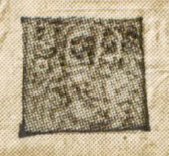
`Abd-hu al-Dhikr
His Servant the [messianic] Dhikr (Remembrance).
Seal 2 = to the right of the main text.
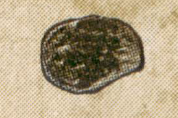
Add here.
Select Notes and Studies
Stephen Lambden 2021.
Ā Ī Ū ā ī ū Ḍ ḍ ḥ Ḥ ṣ Ṣ ṭ Ṭ ẓ Ẓ
Ā Ī Ū ā ī ū Ḍ ḍ ḥ Ḥ ṣ Ṣ ṭ Ṭ ẓ Ẓ
[1]
The Dhikr (messianic "Remembrance")
of the Countenance of thy Lord, is the One Elevated / `Alī (`aliyy /`Alī) who crieth out,
" I am indeed the True One" [God] (anā al-ḥaqq)!
The Dhikr or messianic "Remembrance", the Bab, as the eschatological `Ali, is hre pictured as the one who cries out " I am indeed the True One" [God] (anā al-ḥaqq)!". This elevated claim of the Bab, anā al-ḥaqq, "I am the True One / God" echoes that of the God-intoxicated Sufi Ibn Mansur al-Hallaj (d.922 CE).
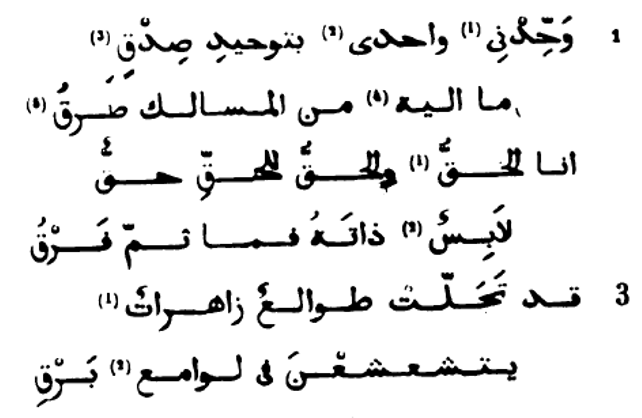
Text. Hallaj Diwan - Massignon (1931)… Carl Ernst … 2018 = Hallaj, Poems of a Sufi Martyr, XX
- My Unique One (wāḥidī) chose me for a genuine Oneness [unique Truth] (bi-tawḥid ṣidq)
- One to which no pathways (al-masālik) lead
- For I am the Truth – Real [God] (anā al-ḥaqq), a truth that truth deserved (wa'l-ḥaqq li'l-ḥaqq ḥaqq)
- Clothing its essence (dhāt) with no more separation (farq).
- Rising suns have manifested, shining,
- Glittering, and the rising suns are lightening (barq).
Lambden trans. based on and citing Carl Ernst, al-Hallaj, No 102 p.171 = Massignon. La Diwan JA (1931), No. 39 p. 75.
The anā al-ḥaqq claim of the Bab is also found quite frequently in the early, mid. 1844 CE Qayyum al-asma' where the word al-Haqq is practically omnipresent occuring something like times and about XX times in the here theophanic utterance anā al-ḥaqq !
Around 600 years after al-Hallaj, the first Safavid ruler Shah Isma'il (d.930/1524) likewise uttered the anā al-ḥaqq in some of his mystical poetry in which he used the pen-name Khaṭā'ī , in his Dīvān-i Khaṭā’ī - ديوان خطائى . This a Sufi Shaykh and one time head of the Qizilbash made use of maẓhar and ḥaqq theophanological terminology in certain of his Turkish, somewhat (neo-) ghuluww (extremist) and high imamological and theophanologically oriented poems. Apparently referring to himself he states in one poem : contained in his Turkish Diwan:
"A man (ādam) has become a maẓhar of the ḥaqq (Ultimately Real).. My Beauty is a maẓhar ("Manifestation") of Our God (jamālī maẓhar ilāhhum...) (no. 259), (Minorsky, 1942: 1039a-1040a,194).
“The mystery of Ana al-Haqq ('I am the Truth') [ana al-haqq sirri] is hidden in this my heart. I am the Absolute Truth [haqq matlaq-im] (or "God“!) and what I say is Truth [haqq].”
(Minorsky text p.1037a, Minorsky trans. 1047a; Lambden slightly adapted with select transliteration indicated).
It is interesting to note that the shrine of Shah Isma'il I (d.930/1524) who caimed to be the maẓhar (Manifestation) of the ḥaqq (Ultimately Real) and uttered the "I am the Truth – Real [God" , the anā al-ḥaqq was born in Ardabil and is buried in Ardabil, the home town of the Fourteenth Haykal, the Letter of the Living, Mullā Yūsuf Ardabīlī (d. Ṭabarsī 1265 /1849). See image at top of this page :
♦



